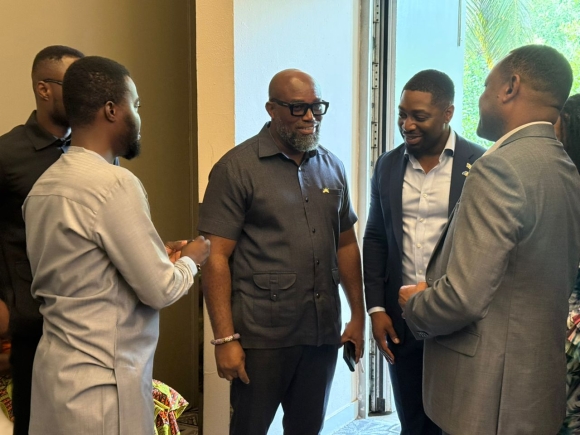The Executive Chairman of the McDan Group of Companies, Dr Daniel McKorley, has called for the establishment of direct logistics and trade corridors between Africa and the Caribbean, describing the current lack of connectivity as a major barrier to economic progress and Pan-African unity.
Speaking during a McDan Masterclass on the final day of the Africa-Caribbean Business Trade Expo in Accra, Dr McKorley—popularly known as McDan—lamented the frustrating logistics involved in moving goods between the two regions.
“If you want to move a box of cargo from here, you will land first in either Ethiopia or Kenya, and it will move back to Florida before it gets to the Caribbean,” he said. “And if you are in Saint Lucia or Grenada, it may land in Barbados or the Dominican Republic, taking up to two and a half weeks.”
With over three decades of experience in logistics, McDan described the situation as a man-made challenge that can be addressed with bold leadership and the will to act. “They have done everything that they could to separate us, but the spirit is still strong,” he said. “Classes like this are where brains come together to find solutions. We cannot always be talking about problems. It’s time we talked about solutions.”
In a commitment to bridging the gap, McDan announced that by mid-2025, he would dedicate one of his cargo vessels to ply the Africa-Caribbean route, making it easier for businesses in both regions to access goods, share ideas and strengthen economic ties. “This will be my way of contributing to what our forefathers began,” he said.
The logistics magnate urged participants to see trade connectivity not just through a geographical lens, but as a dismantling of mental and systemic barriers. “When we say one market, we are not just talking about geography. We are talking about removing mental borders,” he noted, adding that Africa and the Caribbean have long been divided by legal frameworks and artificial boundaries.
He highlighted the African Continental Free Trade Area (AfCFTA) as a game-changing framework and stressed the need to recognise the Caribbean as its “sixth region.” “All trade barriers, logistic connections, and human resource investments should be streamlined to include the Caribbean. It’s not just symbolic—it must be strategic,” he stated.
McDan, who has visited over 40 Caribbean states in recent years, said the emotional and spiritual bond between Africa and the Caribbean remains intact, but more must be done to close the economic gap. “Our forefathers’ spiritual connectivity is still there. But we, the Gen Zs, are not there,” he said, calling for curriculum reforms in Caribbean education systems to reconnect younger generations with African history and culture.
He concluded by reminding participants that the masterclass was not about rhetoric but results. “Let this not be another talk shop. Let’s leave here with actionable ideas, real deals and enduring partnerships. The time for emotional speeches is over. The time for building trade routes is now.”
